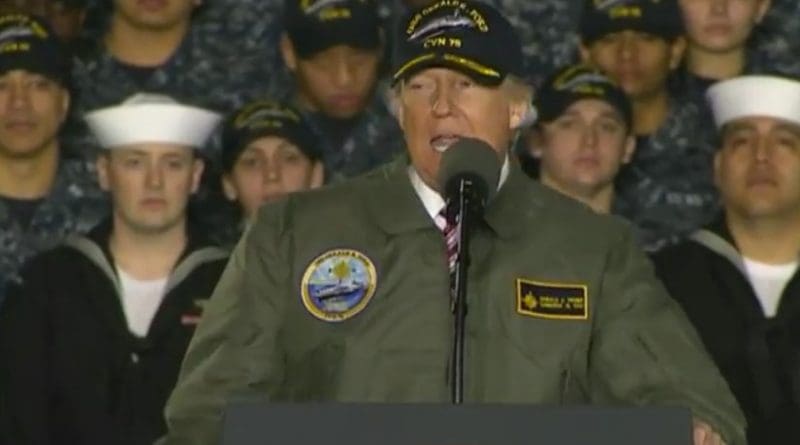Trump Abandons Economic Reforms To Embrace War Spending – OpEd
By MISES
By Ryan McMaken*
In February, David Stockman pointed out that the Trump administration appears none too interested in addressing many of the economic issues that Trump claimed would be at the center of his administration.
Instead, Stockman noted, Trump spent all his time obsessing over his travel ban — which he still can’t get beyond the courts — and other non-economic issues. Stockman noted:
It’s the economy, stupid. … Trump was elected because flyover America is hurting economically. The voters of Racine, Wisconsin and Johnstown, Pennsylvania are imperiled not because of some refugees, they’re imperiled because their jobs have all been disappearing for decades. The problem is far more the Federal Reserve, Janet Yellen, the bubbles they’re creating on Wall Street…
And that was even before Trump mishandled the Obamacare repeal.
But now that it’s April, it’s all the more clear that Stockman was right. Trump and the GOP have already abandoned the Obamacare issue — and the Trump administration has now signaled there won’t be any attempts at tax cuts anytime soon.
In February, Trump was promising a corporate tax cut bill “in two or three weeks.” Now, nothing’s even on the horizon. Obamacare has also been relegated to the back burner.
Nor should we expect anything on monetary policy. Trump has already hired a Treasury Secretary who praises Janet Yellen, and if Trump is as “anti-establishment” on monetary policy as he is on foreign policy, then we can expect Trump to offer simply more of the same. And, given Trump’s big spending plans, Trump will certainly need the Fed with its ability to further monetize the deficit spending Trump is more than happy to keep going full speed ahead.
Moreover, when the economy enters recession, we can expect Trump to call for both massive monetary and fiscal stimulus, just as his Republican predecessor George W. Bush did in the face of recession in 2001 and again in 2008.
In response to the administration’s obvious disinterest in economic issues, the Trump fanboys will surely cry “give him some time!” But, if Trump actually cared about these issues, he’d be talking about the need for tax cuts and relief from Obamacare. He’d be making speeches. He’d be meeting with Congress about it. He’d be telling voters to call their members of Congress and demand reform. He’d be giving press conferences on how we need to get the government off the backs of the people.
But no. None of that is happening.
What’s worse, what few changes Trump has made on regulatory reform have all been made through executive order. This means they will be immediately reversible when another administration comes in — probably four years from now.
To make any lasting reform, Congress would need to take action on these matters, but Trump is either too lazy or too inept or too apathetic to do the hard work that comes with this type of lawmaking. In order to move beyond Rule by Decree, which is clearly Trump’s favored type of governing, he’d have to work with Congress. But this so-called “master negotiator” apparently lacks the necessary skills.
It is now increasingly clear that the Trump administration is going to be at least four years of endless war, budget-busting spending, massive deficits, and more big government in general. His demonstrated preference is not for addressing the issues that won him the Rust Belt states. He’s a war president now, and has better things to do.
Moreover, Trump has already declared 75 percent of the federal budget to be off limits to budget cuts, and has pledged to spent a trillion more in infrastructure spending on top of the already bloated social-spending budgets that he has pledged to not touch.
He has also called for $50 billion more in military spending, in just the next year alone.
That $50 billion is just chump change compared to what Trump will likely spend with his big plans for multiple wars, including wars in Syria and North Korea. Wars with boots on the ground — should Trump continue down that road — don’t just cost a few hundred billion dollars. They cost trillions. According to one conservative estimate, the US has spent $3.6 trillion on wars between 2001 and 2016. (That not including future obligations to disabled veterans thanks to the wars.) What could have been done with that money? To use the words of Trump himself: “we could have rebuilt our country — twice.”
Indeed, it may be a repeat of the George W. Bush years when Bush — via Medicare expansion — gave us the largest expansion of the welfare state since Johnson’s Great Society, and then went on to break the bank with massive deficit spending on wars and welfare. Much of this, by the way, was done during a six year period when the GOP had control of both the White House and Congress.
Knee-jerk defenders of the GOP will no doubt point out that Obama spent immense amounts of taxpayer funds too, and that he placed huge regulatory burdens on American workers and business owners. No one denies that, nor did anyone seriously claim that Obama was going to be a budget cutter or lessen the burden of government on middle-class workers. Trump and his supporters do make such claims.
If Trump’s only claim to fame is going to be “Hey, I’m slightly less awful than Obama,” that will probably be good enough for some people. But many of us aren’t going to be falling over ourselves to thank Trump for the few scraps that fall from his table.
About the author:
*Ryan McMaken is the editor of Mises Wire and The Austrian. Send him your article submissions, but read article guidelines first. (Contact: email; twitter.)
Source:
This article was published by the MISES Institute

